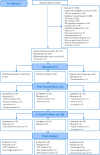The impact of mindfulness on working memory-related brain activation in breast cancer survivors with cognitive complaints
- PMID: 37922071
- PMCID: PMC11925989
- DOI: 10.1007/s11764-023-01484-0
The impact of mindfulness on working memory-related brain activation in breast cancer survivors with cognitive complaints
Abstract
Purpose: Cancer-related cognitive impairment (CRCI) has been associated with altered brain activation after chemotherapy in areas related to working memory. Hence, improving working memory capacity and associated brain activation might aid in the recovery of CRCI. In this study, we investigated the potential of a mindfulness-based intervention (MBI) to impact working memory-related brain activation.
Methods: Female breast cancer survivors reporting cognitive complaints (N=117) were randomized into a mindfulness (n=43; MBI), physical training (n=36; PT), or waitlist control condition (n=38; WL). Participants completed MRI scans before the intervention, immediately after, and three months post-intervention. Task-based functional MRI was used to measure differences between groups over time in working memory-related brain activation while performing a visual-verbal n-back task.
Results: Data of 83 participants (32/26/25 MBI/PT/WL) was included. Compared to the waitlist group, MBI participants showed reduced task-related activation in the right middle frontal and angular gyrus and increased activation in the right dorsal posterior cingulate cortex over time. Compared to the physical training group, MBI participants showed reduced brain activation in the bilateral superior parietal lobule and right dorsal anterior cingulate cortex over time. No differences between physical training and no intervention were identified.
Conclusion: This study showed that an 8-week mindfulness-based intervention can significantly alter brain activation across brain regions involved in working memory, attentional control, and emotion processing during performance of a working memory task. This might aid in the recovery of CRCI.
Implications for cancer survivors: Mindfulness might alter brain activation patterns while performing a working memory task, which might ultimately aid in restoring higher order cognitive functions.
Keywords: Breast cancer; Cognition; Mindfulness; Task based; Working memory; fMRI.
© 2023. The Author(s).
Conflict of interest statement
Declarations. Ethics approval: The study was approved by the ethics committee of UZ/KU Leuven (S59396) and conducted in accordance with the Declaration of Helsinki. Consent to participate: Written informed consent was obtained from all individual participants included in the study. Competing interests: The authors declare no competing interests.
Figures


References
-
- Mounier NM, Abdel-Maged AES, Wahdan SA, Gad AM, Azab SS. Chemotherapy-induced cognitive impairment (CICI): an overview of etiology and pathogenesis. Life Sci. 2020;258:118071. - PubMed
-
- Feng Y, Zhang XD, Zheng G, Zhang LJ. Chemotherapy-induced brain changes in breast cancer survivors: evaluation with multimodality magnetic resonance imaging. Brain Imaging Behav. 2019;13(6):1799–814. - PubMed
Publication types
MeSH terms
LinkOut - more resources
Full Text Sources
Medical

